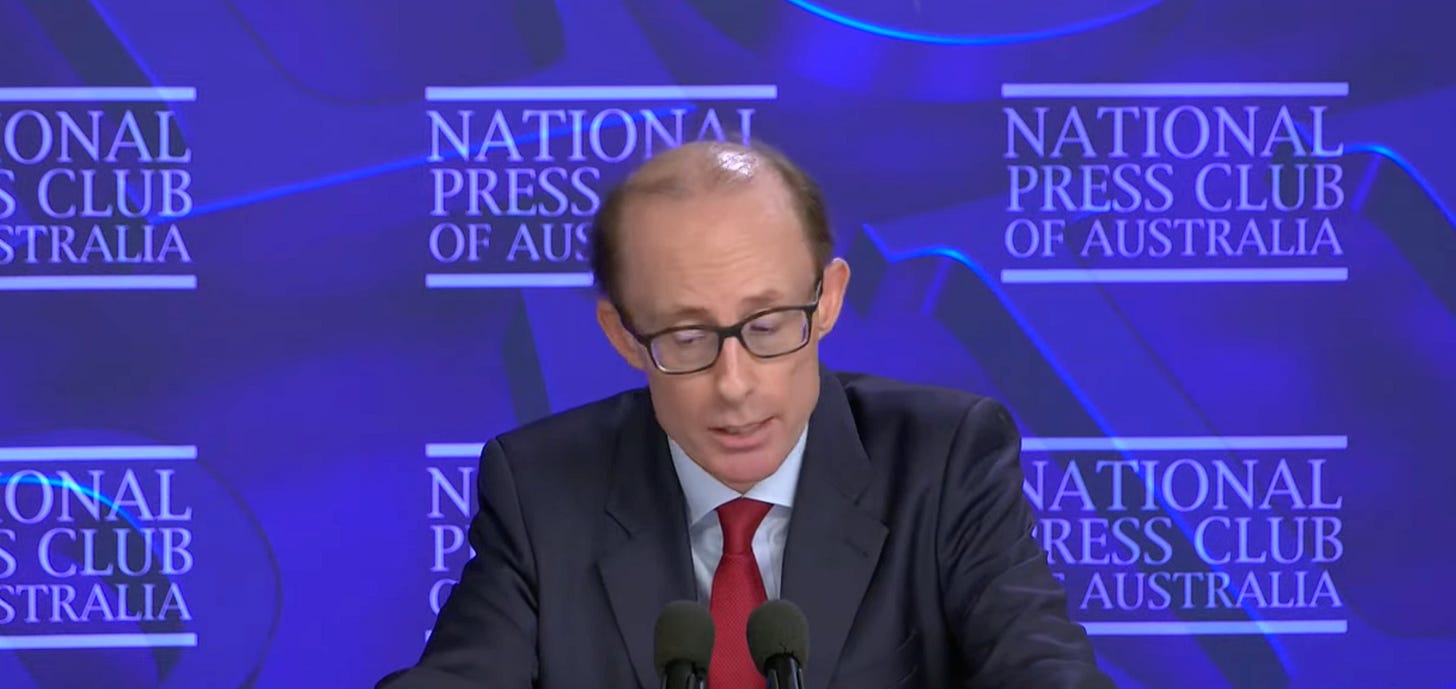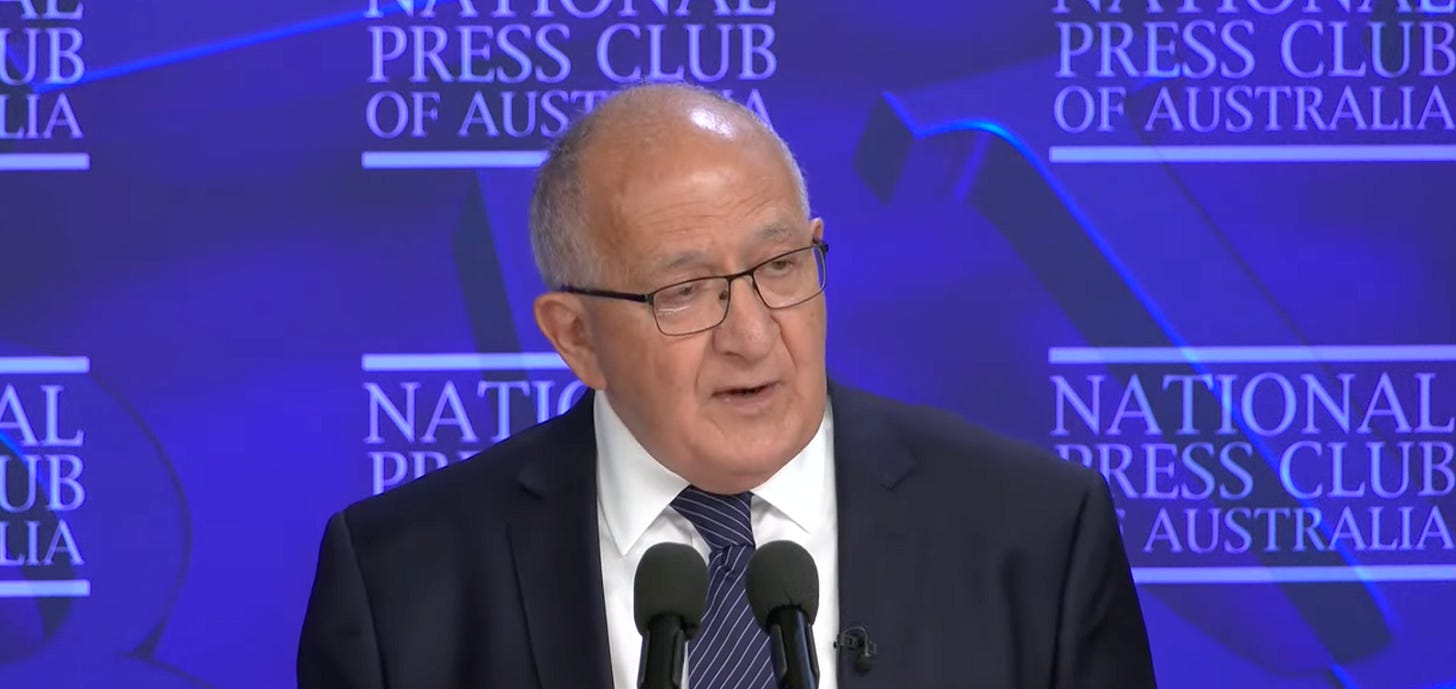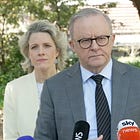UN Experts Urge Australia to End Military Trade with Israel, Call Palestinian Recognition Insufficient
This piece is freely available to read. Become a paid subscriber today and help keep Mencari News financially afloat so that we can continue to pay our writers for their insight and expertise.
Today’s Article is brought to you by Empower your podcasting vision with a suite of creative solutions at your fingertips.
Two United Nations human rights experts called Tuesday for sweeping changes to Australia’s relationship with Israel, demanding an immediate end to all military-related trade and warning that the country’s recent recognition of Palestinian statehood falls far short of its legal obligations under international law.
Chris Sidoti, a human rights lawyer and investigator, and Prof Ben Saul, UN Special Rapporteur on human rights and counterterrorism, told the National Press Club that Australia must conduct a comprehensive review of all ties with Israel and implement restrictions similar to those imposed on Russia following its invasion of Ukraine.
“Recognition as a legal act has occurred, but it needs to be followed by consistency in the political approach to the state of Israel and the state of Palestine,” Sidoti said. “Recognition is an important step. It starts to address the issue of inconsistency. But the obligations that we have under the law extend well beyond recognition.”
Sidoti outlined nine specific actions Australia should take, beginning with prohibiting all military-related trade with Israel beyond the existing arms embargo that bars weapons and munitions sales.
“If components that are being manufactured here in Australia are finding their way into F-35 aircraft being used by the Israeli Air Force to bomb the hell out of Gaza, we share responsibility,” Sidoti said. “It’s as simple as that.”
Truth matters. Quality journalism costs.
Your subscription to Mencari directly funds the investigative reporting our democracy needs. For less than a coffee per week, you enable our journalists to uncover stories that powerful interests would rather keep hidden. There is no corporate influence involved. No compromises. Just honest journalism when we need it most.
Not ready to be paid subscribe, but appreciate the newsletter ? Grab us a beer or snag the exclusive ad spot at the top of next week's newsletter.
He said Australia manufactures components for F-35 fighter jets as part of an international agreement with Lockheed Martin, and those components have been used by Israeli forces in Gaza since Oct. 7, 2023.
“Regardless of the trade relationships, the component construction industry, the supply chains, we have legal obligations,” Sidoti said.
The human rights lawyer called for ending all military and defense cooperation with Israel, including closing a trade and defense office established in Jerusalem in 2019 and shutting down defense cooperation components at the Australian Embassy in Tel Aviv
.
Sidoti said Australia should treat any Israeli military personnel who served in Gaza since Oct. 7, 2023, as suspects who should be investigated and potentially prosecuted under Commonwealth criminal law.
“Anyone, whether an Australian citizen or not, who seeks to enter this country, having served in any arm of the Israeli military in Gaza since the 7th of October, 2023, should be treated as a suspect and investigated and, if necessary, prosecuted,” he said.
He said Australian law covers war crimes, crimes against humanity and genocide committed anywhere in the world, and should be expanded to criminalize service in foreign military forces, not just foreign armed groups.
“There is no reason why Australian citizens should be permitted to serve in the military forces of another country whether it’s China or Russia or the United States or Israel,” Sidoti said. “It’s as simple as that.”
Additional recommended measures include expanding sanctions beyond the two extremist Israeli ministers already sanctioned, ending cooperation in innovation and security technology, halting all trade with Israeli settlements, and making clear Australia will enforce International Criminal Court arrest warrants.
“If anybody subjected to an arrest warrant from the International Criminal Court sets foot in this country, that person will be arrested,” Sidoti said.
Saul welcomed Australia’s recognition of Palestine but said the country should take a stronger leadership role on human rights.
“Australia is the world’s 13th largest economy, more than a modest middle power,” Saul said. “If we don’t step up in a world where democracy and human rights are critically endangered at this moment and our closest ally cannot be relied upon, then who will step up?”
Both experts sharply criticized President Donald Trump’s 20-point Gaza peace plan announced Monday, though Sidoti said he supports it if it stops the killing.
Saul said key elements raise red flags under international law, including a proposed transitional government that excludes the Palestinian Authority and does not respect self-determination.
“History suggests we should be sceptical of peace without justice, peace at any price, and plans imposed by outsiders without Palestinian consent,” Saul said.
He said the plan’s oversight by a Trump-chaired Board of Peace is not authorized by the United Nations and lacks transparent multilateral control.
“The US is a deeply partisan supporter of Israel and not an honest broker,” Saul said. “Tony Blair, who might sit on this board, has little international legitimacy after illegally invading Iraq.”
Saul said an international stabilization force outside UN control appears to replace Israeli occupation with indefinite U.S.-led occupation, contrary to self-determination principles.
“Partial Israeli occupation will continue, potentially indefinitely, through a, quote, security perimeter around all of Gaza’s borders, and the demilitarization of Gaza, if permanent, could leave it vulnerable to Israeli aggression,” he said.
The professor said the plan does not address accountability for Israeli international crimes, fundamental issues like illegal settlements and borders, or provide any commitment to transitional justice or historical truth-telling.
“The plan doesn’t address accountability at all for Israeli international crimes and human rights violations in Palestine,” Saul said.
Sidoti took a different tactical view while agreeing with Saul’s critique.
“I support the Trump peace plan 100%,” Sidoti said. “I agree with everything Ben said in his critique of it, but in fact it’s not worth the paper it’s not written on.”
He said the situation has always worked on smoke and mirrors, and if pretending the peace plan will work stops the killing, it deserves support.
“When the killing stops and the starvation campaign stops and the hostages are released and the Palestinians arbitrarily detained are released, then we can all admit that the peace plan is going nowhere because it won’t,” Sidoti said. “But for God’s sake, let’s stop kids being killed.”
Both experts said Australia’s legal obligations stem from International Court of Justice rulings and international conventions. Sidoti said the court’s January 2024 order on provisional measures in South Africa’s genocide case against Israel triggered Australia’s obligation under the Genocide Convention to prevent genocide.
“The Genocide Convention not only requires that we not commit genocide, it also requires that we act to prevent genocide,” Sidoti said. “And that obligation to act to prevent was triggered by the International Court of Justice order of provisional measures.”
The court issued additional orders in April and May 2024 reinforcing that obligation, he said. In July 2024, the court ruled Israel’s occupation and settlements unlawful and directed other states not to aid or assist continuation of unlawful activities.
“When I look at international law, I am aware of these obligations, treaty obligations, the obligation under the Genocide Convention to act to prevent genocide, the obligation under the Geneva Conventions dealing with international humanitarian law to act to ensure that other states respect international humanitarian law,” Sidoti said.
He said Australia should have conducted an immediate comprehensive review after the July ruling of all aspects of its relationship with Israel to identify areas that could be aiding or assisting unlawful acts.
“If it exists, make it public. If it doesn’t exist, do it,” Sidoti said.
Saul compared Australia’s tepid response on Gaza to its comprehensive approach regarding Russia’s invasion of Ukraine.
“Australia’s been absolutely right to throw the law book and heap political pressure on Russia for its invasion, really comprehensive sanctions on Russian nationals as well as financial and other sanctions on the Russian state,” Saul said.
He said Australia supported international litigation against Russia, a war damage compensation fund, and other strong measures.
“Contrast that with our position on Gaza, which has been pretty tepid, actually,” Saul said. “All we’ve really done is sanctions on two far-right ministers, not the war cabinet responsible for the international crimes in Gaza, not the military leaders in charge of prosecuting the war.”
Sidoti said his Commission of Inquiry found in June 2024 that Israel is committing war crimes and crimes against humanity in Gaza through both individual acts and the overall pattern of strategy and operations.
Two weeks ago, the commission released a report finding genocide, which Sidoti said took two years to reach.
“It’s not up to the courts alone,” Sidoti said. “The courts are the ultimate authority. When we released our report, we acknowledged that explicitly. The International Court of Justice is the highest authority on this issue.”
He said the commission’s report provides the most authoritative statement on genocide until the court rules, which could take two or three years.
“At this point for us there is no doubt,” Sidoti said. “And I think journalists too should be coming to the same conclusion.”
Saul defended Palestine’s legal status as a state, saying international consensus holds that Palestinian territory is defined by pre-1967 borders encompassing the West Bank, East Jerusalem and Gaza.
“There is international consensus that Palestine’s territory is presumptively defined by the pre-1967 war borders,” Saul said. “The precise borders remain to be agreed, but this has never been fatal to the existence of states, many of whom have disputed borders.”
He said Palestinians have an undisputed right to self-determination and recognition by three-quarters of the world provides powerful evidence Palestine meets legal criteria for statehood.
“Most countries are now persuaded that statehood can exceptionally emerge, even without full independence, where self-determination has been forcibly denied by occupation for so long,” Saul said.
He dismissed arguments that recognition rewards terrorism or requires Israeli security guarantees first, saying the International Court of Justice rejected such constraints on Palestinian rights.
“Self-determination is the legal right of the whole Palestinian people, which cannot be denied on the basis of Hamas’s actions,” Saul said.
Both experts acknowledged domestic political pressures complicate Australia’s response. Saul said fear of being stigmatized as anti-Semitic drives self-censorship among politicians and journalists.
“There’s a political divide between the major parties on this, which has been pretty toxic, I’d say, over the last two years,” Saul said. “There’s lots of interest group politics, which has driven division as well.”
He said journalists face pressure and job security concerns, citing Antoinette Lattouf’s case, leading to self-censorship.
Sidoti said Palestinian journalists in Gaza have been “models of heroism” in reporting under dangerous conditions, with hundreds losing their lives.
“We have depended entirely on Palestinian journalists in Gaza to get out information about what is happening,” Sidoti said. “And they have done so not just with their own investigations and reporting, but with video evidence, photographic evidence, things that can be confirmed.”
He said Australian journalists face pressure from both sides and increasingly fear consequences for their reporting.
“I know that journalists are under enormous pressure and I have been told by Australian journalists about the pressure that they are under,” Sidoti said.
When asked about UN legitimacy after the Gaza crisis, Saul said he remains optimistic the organization will recover authority despite current dysfunction.
“The Rwandan genocide was a worse failure than Gaza, frankly. I mean, 800,000 people killed in 100 days,” Saul said. “So we’ve been here before and in worse situations.”
He said the UN remains useful as a place where states with radical disagreements can pursue dialogue over violence, noting this year marks the organization’s 80th anniversary.
“Most countries are opposed to what Israel is doing, and Israel and the US are now incredibly isolated, and I think that’s a really positive sign for the future, actually,” Saul said.
Sidoti said Prime Minister Anthony Albanese’s approach has been to follow Western European states on Palestine issues rather than leading.
“We Australians like to think of ourselves as rugged individualists, but, in fact, we always travel in a pack,” Sidoti said. “But if we want to be on the Security Council, we’ve got to turn ourselves from camp followers to being the leaders of the pack.”
The experts’ recommendations come as Australia seeks election to the UN Security Council for 2029-2030, which Albanese announced last week.
Sidoti said what distinguishes Gaza from other conflicts is that Palestinians have no means of escape from the fighting.
“In every other conflict in decades, and probably in my lifetime, so that’s almost 75 years, there has been the capacity for people to get away,” Sidoti said. “The people in Gaza are captured. They can’t go anywhere.”
He said Israeli authorities have pursued an operation of total destruction since the first day, with two million people squeezed into an area half the size of Canberra unable to escape saturation bombing and starvation.
The National Press Club address occurred as international attention focuses on whether Hamas will accept Trump’s peace framework and whether the plan can end fighting that has continued for nearly two years since the Oct. 7, 2023, attacks.
Sustaining Mencari Requires Your Support
Independent journalism costs money. Help us continue delivering in-depth investigations and unfiltered commentary on the world's real stories. Your financial contribution enables thorough investigative work and thoughtful analysis, all supported by a dedicated community committed to accuracy and transparency.
Subscribe today to unlock our full archive of investigative reporting and fearless analysis. Subscribing to independent media outlets represents more than just information consumption—it embodies a commitment to factual reporting.
As well as knowing you’re keeping Mencari (Australia) alive, you’ll also get:
Get breaking news AS IT HAPPENS - Gain instant access to our real-time coverage and analysis when major stories break, keeping you ahead of the curve
Unlock our COMPLETE content library - Enjoy unlimited access to every newsletter, podcast episode, and exclusive archive—all seamlessly available in your favorite podcast apps.
Join the conversation that matters - Be part of our vibrant community with full commenting privileges on all content, directly supporting The Evening Post (Australia)
Catch up on some of Mencari’s recent stories:
It only takes a minute to help us investigate fearlessly and expose lies and wrongdoing to hold power accountable. Thanks!









